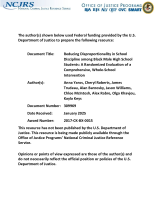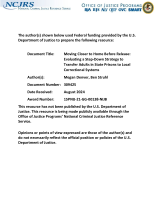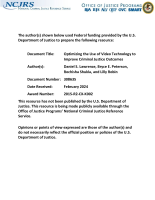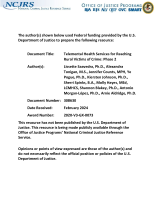Evaluation Costs
Minnesota Community Corrections Act Evaluation - General Report
Reducing Disproportionality in School Discipline among Black Male High School Students: A Randomized Evaluation of a Comprehensive, Whole-School Intervention
Moving Closer to Home Before Release: Evaluating a Step-Down Strategy to Transfer Adults in State Prisons to Local Correctional Systems
Optimizing the Use of Video Technology to Improve Criminal Justice Outcomes
Telemental Health Services for Reaching Rural Victims of Crime: Phase 2
Evaluation of Culture and Climate Effects in the Virginia Department of Corrections Cognitive Communities
Enhancing Vocational Training in Corrections: A Type 1 Hybrid Randomized Controlled Trial Protocol for Evaluating Virtual Reality Job Interview Training Among Returning Citizens Preparing for Community Re-entry
NIJ Multisite Impact and Cost-Efficiency Evaluation of Veterans Treatment Courts
Formative Evaluation and Evaluability Assessment of a Family Justice Center
A Multi-Site Randomized Controlled Trial of an Enhanced Field Training Officer Program: An Analysis of Administrative Outcomes and Community Interactions
NIJ Multisite Impact and Cost-Efficiency Evaluation of Veterans Treatment Courts
School Safety and School-Based Mental Health Services in a Large Metropolitan School District
Ensemble Subspace Segmentation Under Blockwise Constraints
NIJ Multisite Impact and Cost-Efficiency Evaluation of Veterans Treatment Courts, Fiscal Year 2022
Deadline Notice
The deadline for the funding opportunity discussed in this video has passed.
See the YouTube Terms of Service and Google Privacy Policy
Addressing Student Mental Health Concerns - Breakout Session, NIJ Virtual Conference on School Safety
On February 16-18, 2021, the National Institute of Justice hosted the Virtual Conference on School Safety: Bridging Research to Practice to Safeguard Our Schools. This video includes the following presentations:
See the YouTube Terms of Service and Google Privacy Policy
Evaluability Assessment of the Weinberg Center for Elder Justice's Elder Abuse Shelter Services
Day Reporting Centers in New Jersey: No Evidence of Reduced Recidivism
PARAPROFESSIONALS IN PROBATION - A SYNTHESIS OF MANAGEMENT ISSUES AND OUTCOME STUDIES
Experimental Test of Rehabilitative Field Work for Moderate-to-High Risk Adults
A Law Enforcement Pathway to Treatment: A Multi-Site Evaluation of Self-Referral Deflection Programs
Benefit-Cost Analysis for Crime Policy
How do we decide how to allocate criminal justice resources in a way that minimizes the social harms from both crime and policy efforts to control crime? How, for that matter, do we decide how much to spend on the criminal justice system and crime control generally, versus other pressing needs? These questions are at the heart of benefit-cost analysis.
See the YouTube Terms of Service and Google Privacy Policy
Research and Evaluation on Drugs and Crime, FY 2017 Solicitation Webinar
This webinar will provide details and guidance for potential applicants to the National Institute of Justice's Research and Evaluation of Drugs and Crime FY 2017 solicitation. The presenters will discuss the purpose and goals of this funding opportunity and address frequently asked questions. A Q&A session will conclude this webinar.
See the YouTube Terms of Service and Google Privacy Policy







